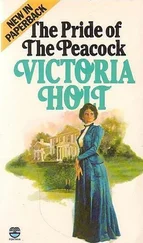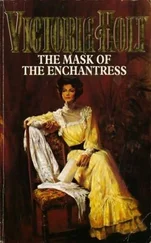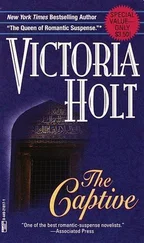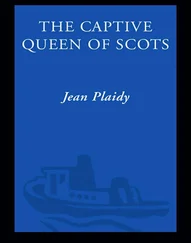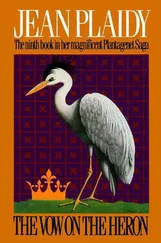‘I think I caught it on a bramble in the garden.’
‘What a neat clean little girl you are. Now, Charlotte … there was nothing neat about Charlotte. She used to come in sometimes, bounding in so that she would well nigh knock you over; and she would be so excited she wouldn’t be able to get the words out. She’d stutter and grow quite angry with herself. You speak beautifully.’
‘I have to learn how to pronounce my words; I have to read a great deal.’
‘I’m sure you do. And very nice too.’
‘But I think you liked Charlotte’s stutter.’
‘Oh, Charlotte!’ Louisa laughed. ‘She could be a very naughty little girl sometimes … but in a lovable way, if you understand.’
It was rather difficult to understand, thought Victoria, because Louisa somehow managed to convey that Charlotte’s naughtiness was more attractive than other people’s goodness and her stutter far more to be desired than the clearest form of speech.
‘Such a time she had with them all on at her. Her father … her mother. Oh, it wasn’t natural. And then your Uncle Leopold came like Prince Charming in the fairy tale and they were all set to live happy ever after. I never saw Charlotte so happy as on her wedding day. He was the sun, moon and stars to her; he was the whole world. He was the only one she would listen to. She used to comb his hair herself when he came back from riding. She wouldn’t let anyone else touch it. Then she’d take off his boots. Never a cross word between them; and when she knew she was going to have a child she said to me: “There can’t be more happiness in Heaven than this.”’
Louisa released one hand from the mending to search for a handkerchief in her pocket. She wiped her eyes.
‘Poor dear soul. Little did she know that she and her sweet babe would soon be in Heaven.’
Victoria wept. There were always tears at these sessions because Louisa’s accounts were so touching.
Then she finished off the lace and said brightly: ‘What about a nice cup of tea?’ And she made it in her room and Victoria always felt it was an adventure to drink tea with Louisa – just like a grown-up visitor.
But the visit came to an end and the Baroness Lehzen came up to tell her that her presence was required in the drawing-room.
And there was Feodora with her husband and Mamma and Uncle Leopold, and Mamma was saying that she would give a dejeuner at Kensington when the bride and groom would have an opportunity of saying their last farewells to the family before they set out for Dover.
So Victoria took leave of Feodora feeling that she had lost her already, although Feodora whispered that they would write to each other often.
Then she drove back to Kensington seated in between Mamma and Charles.
* * *
There was one more trip to Claremont; this was to say goodbye to Feodora.
The sisters clung together.
‘We will write to each other,’ whispered Feodora.
‘I shall wait impatiently for your letters and treasure them always,’ Victoria assured her sister.
Then Feodora’s husband helped her into the carriage which would take her to Dover and across the sea.
Victoria wept and went back to Kensington to tell the dolls that nothing would ever be the same again.
Chapter III
THE CUMBERLAND SCANDALS
In the Gothic house at Windsor, known somewhat inaccurately as The Cottage, the King was sleeping, scarcely aware of the passing of the days. Servants walked about on tiptoe, certain that this day or perhaps the next week would see the end of the reign.
The master of the King’s household could be said to be the Duke of Cumberland; he had the ear of the King and indeed George seemed afraid of him. For what reason no one could be sure but in view of Cumberland’s reputation nothing, however sinister or shocking, need be ruled out.
The Duke of Cumberland was the most feared man in the kingdom. Even his Duchess – herself a formidable character – was somewhat in awe of him, although she was of no one else. Ernest was unlike his brothers; he was tall and thin almost to gauntness, very odd when the family’s tendency to fat was considered. He had lost an eye and the patch he sometimes wore over it made him appear almost as forbidding as he did when the gaunt socket was exposed. His face had been scarred in battle; he was quick-witted, clever, shrewd and ambitious. It was clear that he deplored the fact that he was not the King’s eldest brother; he wanted the throne, and when the Duke of Cumberland wanted something he went out to get it with no lack of enthusiasm.
His marriage to Frederica of Mecklenburg-Strelitz was, oddly enough, a happy one. He and Frederica were contented with each other; they understood each other. They were two of a kind, both adventurers and both ruthless towards those who stood in their way. The Duchess was reputed to have rid herself of two husbands who had become tiresome; the Duke had been suspected of murdering his valet. Their reputations were considerably tarnished but they did not care. It meant that people thought twice before offending them, a very desirable state of affairs.
The Duke was amused because the King had not attended the marriage of the Duchess of Kent’s daughter and as he talked of this to his wife, a rare smile appeared on his grotesque face; she was lying back on a couch sharing his amusement.
‘How I should have liked to have seen her face,’ said the Duchess. ‘She must have been furious.’
‘She’s the most arrogant woman in England.’
‘Imagining herself Queen Mother already.’
Anger showed itself in the twitch of the Duke’s lips. ‘By God, what ill luck. That fat infant … between me and the throne.’
‘We are unlucky,’ agreed his Duchess.
Indeed they were. Dark thoughts of removing the child had been in his mind. He had set rumours in progress concerning her health. But the artful Duchess of Kent only had to parade her child for all to see to make nonsense of that. He had tried to get the young Victoria to Windsor ‘to live under the same roof as the King’, he had said; but that meant living under the same roof as Cumberland, and the Duchess of Kent had sworn that should not be. That old fool Wellington had been on her side and the little scheme had fallen through.
Frederica was regarding him a trifle cynically. His schemes did seem to fail.
‘Perhaps,’ she said, ‘you have not given enough thought to this important matter.’
‘Nonsense. I think of nothing else night and day.’
‘Except Lady Graves.’
‘That.’ He snapped his fingers. ‘I don’t need to take my mind off Victoria for Graves’s wife.’
‘Graves is piqued, I hear.’
‘Let him be.’
He looked at her sharply. Was she jealous? They had an understanding. Their ambition was the same – the throne for him and then for their son George. The fact that he amused himself now and then was unimportant. He had thought that perfectly clear. He might amuse himself with other women but there was only one he really cared for – his wife Frederica. She knew that. And he allowed her perfect freedom too.
‘We don’t want more scandal,’ said the Duchess. ‘There has been enough. If your reputation was not so … vivid … your schemes might not be perceived until after it is too late to foil them.’
She was right. His schemes with regard to Victoria had failed and it was partly because people were prepared to suspect his motives.
It was true that Clarence, the heir to the throne, was generally believed to be unbalanced, verging on insanity; but was that due as much to Clarence’s own odd behaviour as to the rumours his brother Cumberland had set in motion?
‘Well,’ she said, ‘what do you propose?’
Читать дальше

